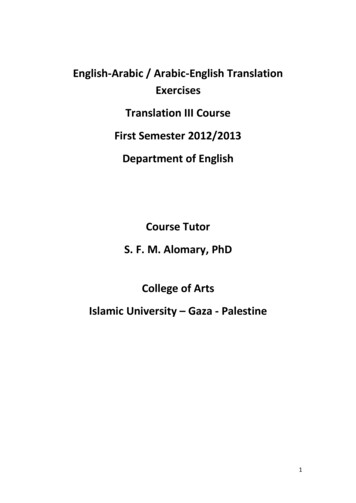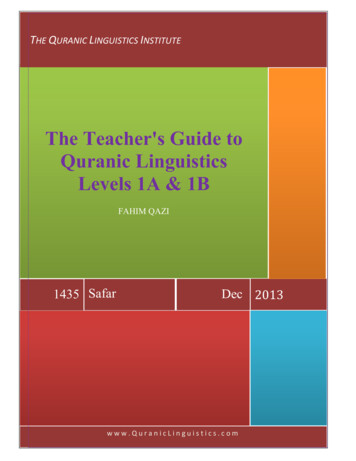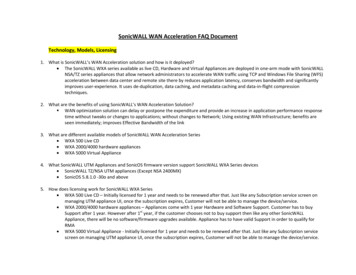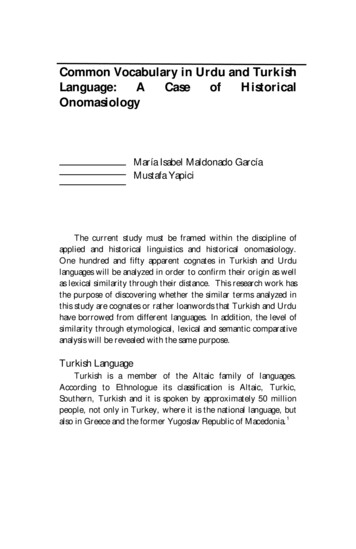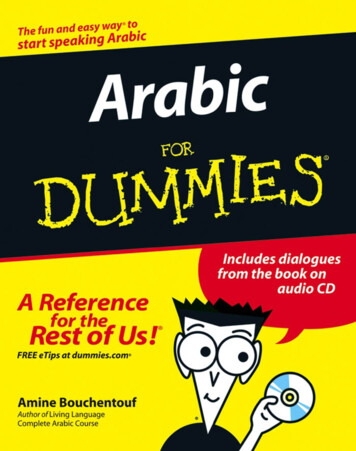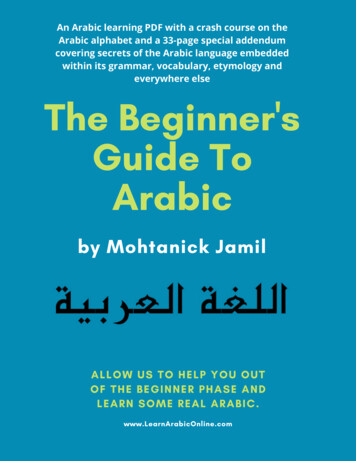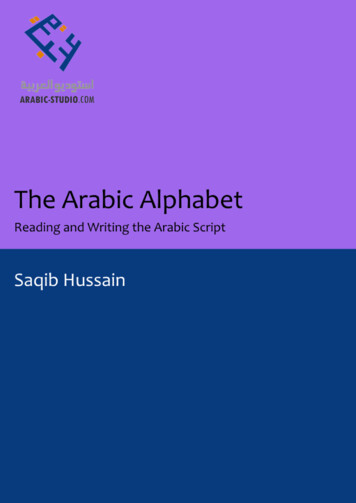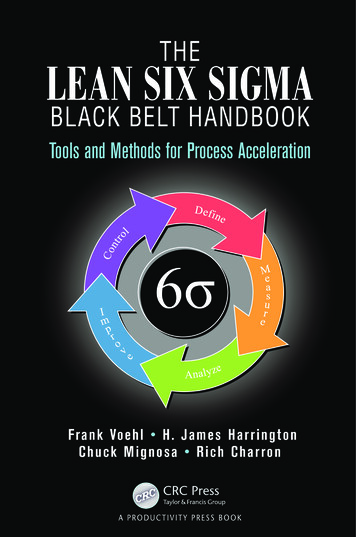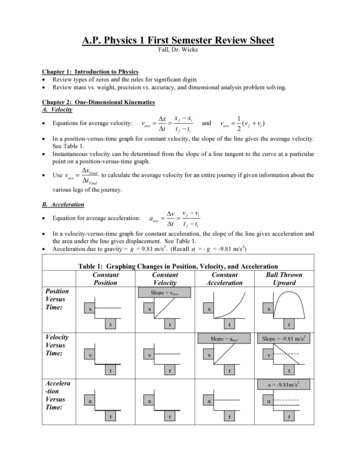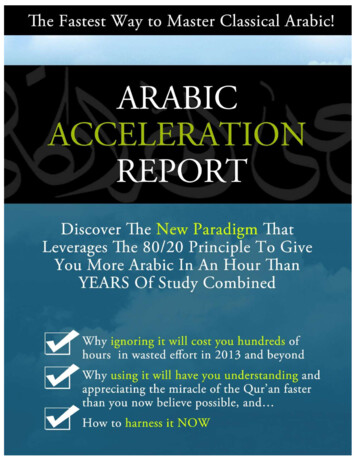
Transcription
Discover The New Paradigm That LeveragesThe 80/20 Principle To Give You More Arabic InAn Hour Than YEARS Of Study Combined Why ignoring it will cost you hundreds of hoursin wasted effort in 2012 and beyond Why using it will have you understanding andappreciating the miracle of the Qur’an faster thanyou now believe possible, and How to harness it NOWTitle and Graphic to be determined
TABLE OF CONTENTSForeword .3The “Secrets” To Mastering Classical Arabic .5Why Am I Writing This Now? .8A Bit About Me .11The Big Mistake .14That’s Preventing Students from Learning Arabic .14The Best Way to Learn Arabic .22Leveraging The 80/20 Principle .23The Most Advanced System for The Conveyance ofMeaning .28Conjugating Verbs in Arabic .38The Science of Sarf .42The Science of Arabic Grammar .43Map of The Arabic Language .49Parts of Speech .50Definitions of ( اسم ism), ( فعل fi’l), and ( حرف harf) .53Classification of an ( اسم ism).54Classification of a ( فعل fi’l) .54Classification of the ( حرف harf) .58Difference Between a Sentence and a Phrase .58Types of Sentences .60
Six Important Terms Related to Sentences.61Issue 1: Sequence Does Not Determine Grammar .63Issue 2: Lack of “is” .65Grammatical States .68A Quick Recap of What We Covered .76Taking It to the Next Level .78
ForewordI still remember my first day in Mufti Yusuf’s class. It wasearly 2004, before his classes were taught online. Thatcold Saturday morning, I left home after Fajr to make sureI would make it to class in time. After an hour on subwaysand buses, I joined my classmates in the little classroom inan Etobicoke high school, eagerly waiting the start of theclass.From the first few minutes, when he started talking aboutpatterns and vowels and grammatical states and humanemotions, I knew this was going to be like no other Arabicclass I’ve ever attended before.This class was different. We weren’t going through someelementary school text book written for children in an Arabcountry. Nor were we going through a succession ofsimple, repetitive exercises in a book for students learningArabic as a second language. It was none of that. In fact,we weren’t following a text book at all.Mufti Yusuf was teaching us Arabic the way that he hadlearned it years before – based on how his teachers hadlearned from their teachers. And that was the key. Irealized that up until this point, I had never studied Arabicfrom a native English speaker who had themselveslearned to master Arabic. 2012 Shariah Program www.shariahprogram.ca Page 3
I had studied with several native Arab teachers (may Allahpreserve and reward them all). But none of them actuallyknew what it was like to learn Arabic as an adult. Theydidn’t see how certain constructs in Arabic were sofundamentally foreign from English. The beautiful logicand patterns inherent to the Arabic language came tothem so easily and intuitively that I don’t think they wereeven conscious of their existence – let alone were theyable to describe them to their students.Suddenly, in that first hour of class, I could see it. Thebrilliance of the Arabic language was being unveiledbefore our eyes.That Ramadan, in taraweeh, I started to realize that Icould follow along. I wasn’t just catching a word here orthere, but I actually understood whole ayahs. I couldunderstand the story! It was all I could do to not jump upand down in salaah!Alhamdulillah, in the years since that class in Etobicoke,Mufti Yusuf has been continuously revising and improvingand refining his program. And now, through this report,you have the privilege of learning from the best of what heteaches.I pray that Allah grants you the tawfeeq to benefit from thiswork. And I pray that He blesses rewards and protectsMufti Yusuf and all of our teachers. Ameen.Sawitri Mardyani (Ph.D.) 2012 Shariah Program www.shariahprogram.ca Page 4
The “Secrets” To Mastering Classical ArabicWhat you now hold in your hands is a snapshot of my 10years of extensive experience in teaching the ArabicLanguage to thousands of students both online and offline.Up until now, this information has been closely held andonly available to select seekers of knowledge who wereaccepted as students to our renowned online Arabicprogram. These are students that prior to finding myprogram had struggled to learn the language for yearsusing every method under the sun. One sister that you’llhear from a little later in this report drove 22 hours fromMississippi to attend my face-to-face program and saidshe learned more in one day than an entire year studyingat Harvard.I ask you to not immediately dismiss that above commentor those on the cover, as upon first glance these claims doseem exaggerated and not entirely accurate. If I hadn’talready verified their accuracy through what I’m about toshare with you in this report I wouldn’t have believed themeither.I’ll tell you up front though that the strategy that leads tothese results takes into account the fundamental natureof the Arabic language. It is my contention that in our 2012 Shariah Program www.shariahprogram.ca Page 5
time for people who are busy with full-time responsibilities,it is the ONLY approach that will work and get you to yourgoals in the fastest, easiest and most results-certain way.It will give you the traction you need to keep you motivatedand enthusiastic in your studies so you never give up.In short, this may well be the most important documentyou ever read on this topic.I strongly suggest you print it out right now, block off anhour, relax in your favorite chair, and read it cover tocover. Then, come back tomorrow and re-read it again.This is material I would normally spread over 8 hours andreinforce with numerous examples and lots of practice. Inthis report I distill for you the core concept behind theapproach. That is, I’m more concerned about explaining toyou how and why it works.If I’m successful in reaching my objective with this report, itwill be well worth the time it takes you to read and study it.Let me make a couple of things clear at the outset.The method I’m about to present to you is not about themost recurring words in the Qur’an. For example, if you 2012 Shariah Program www.shariahprogram.ca Page 6
learn a small list of 300 words, it will give you 80% of thewords that occur in the Qur’an. That’s not what this reportis about. You don’t need me for that.I’m here to tell you that the majority of meanings inArabic don’t even come from the words. They comefrom the vowels, patterns and grammatical structures. In anutshell, if you’re able to understand the mechanism thatgoverns the conveyance of these “non-word” meanings,and then immediately follow-up with reading a text to bringthe theory to life at an early stage, THIS is how you willgain traction and succeed. and, no, it’s not about teaching all of grammar up-fronteither. That would just exhaust you and overwhelm you.The method I will describe below is very different than allof that.So, again Relax. Put your cell phone on silent. Closedown any instant messenger programs you might haverunning in the background, or better yet, print thisdocument out and find a nice quiet spot so you can read itwith complete concentration and without any distractions.At the end of it, I’ll provide you with links to 3 full-lengthvideos (2 hours of actual training), which you can watchthat will develop the concepts further. 2012 Shariah Program www.shariahprogram.ca Page 7
Why Am I Writing This Now?I decided to write this report because I couldn’t stand onthe sidelines any longer, watching students like youstruggle and suffer as they try to learn the language oftheir deen.It hit me recently, thatthe few hundredstudents who sign upfor my course eachsemester aren’t theonly Muslims who havestruggled to learnArabic and are lookingfor a better method.There are thousands, ifnot millions of Muslimsaround the worldsuffering needlessly because they’ve taken the wrongapproach to learning Arabic. They’ve wasted months, ifnot years, making little progress and coming up with littlemore than a list of vocabulary, some seemingly randomrules and a great deal of frustration, if not hopelessness.Don’t worry if I’mdescribing yoursituation. Because inthis report I’ll not onlybe explaining thereasons for these problems, but I’ll give you an exact 2012 Shariah Program www.shariahprogram.ca Page 8
blueprint you can immediately put to work for yourself inorder to overcome these hurdles.My students have told me again and again howdramatically they’ve accelerated their learning using theapproaches, methods and strategies we employ in class—how they’ve learned more in months, weeks, days or evenminutes than they have in years. They shouldn’t be theonly ones to experience this remarkable progress inunderstanding the words of the Qur’an.I wrote this report to share these methods with you. Soyou could experience this success too inshaAllah.The Pain of Not UnderstandingIn my 10 years of teaching Classical Arabic to Englishspeaking adults, I have seen students come to me againand again with the same frustrations.They pray prayers that they don’t understand. They standbehind imams who are moved to tears by the words ofAllah, while they stand there feeling foolish, dumbfoundedand clueless. They attend lectures of Arab scholars andhave no choice but to wait for the translation. And assome speakers don’t translate every poem or hadith theyquote, they feel left out. They feel divorced from a trueunderstanding of their intellectual heritage. They feelmentally crippled and frustrated with their inability toaccess the great works of Muslim scholars from ourhistory. 2012 Shariah Program www.shariahprogram.ca Page 9
Maybe you’ve had a similar experience?Determined to understand the book of Allah, manystudents make numerous attempts to learn Arabic. Ineach attempt at learning the language, they review thealphabet, learn new words, form simple phrases andpossibly touch on a few grammar rules but it never goesbeyond that.They see a vast chasm between where they are andwhere they want to be in understanding Arabic. They tryto traverse this divide again and again to no avail. Theywonder whether they should try studying abroad, but theirresponsibilities at home make this option impossible.After so much time and effort, some just give up. Theyresign themselves to the idea that they’ll never learn thelanguage. It’s too hard. It wasn’t meant to be for them.It’s a shame, really. And it makes me angry when I hearthis. Because Arabic is not a difficult language. NonArab Muslims from around the world have been learning itand mastering it for centuries. The problem isn’t thelanguage, nor is it the student. The problem is the methodof teaching that predominates in this day and age.There Is a SolutionAlhamdulillah, for this problem, there is a solution. 2012 Shariah Program www.shariahprogram.ca Page 10
The solution requires us to go back to our roots and studyArabic as the masters of the language studied it.Once we’ve grasped the fundamental nature of thelanguage from the masters themselves, we can thentweak the teaching method to best match OURaudience—namely mature, Western educated Muslimsthat already have their study habits developed – peoplethat are preoccupied with family and work responsibilitiesthat make it unrealistic for them to travel abroad and studyfor any prolonged period of time.A Bit About MeBefore I do that, you’re probably wondering who I am andwhat my background in this science is Well, I started my formal Islamic education at the IslamicInstitute in Dewsbury, U.K. when I was thirteen. A fewyears later, after I finished memorization of the Qur’an, Ihad the rare privilege of studying grammar andmorphology with some true masters of the science.The reason this privilege is so rare is because of the waythe madrasa system works. In a madrasa, experiencedteachers are quickly promoted from teaching core topics,such as grammar and morphology, to teaching highersciences such as Fiqh and Hadith. The end result is thatvery few students have the opportunity to learn Arabicgrammar and morphology from experienced teachers. 2012 Shariah Program www.shariahprogram.ca Page 11
Alhamdulillah, I got this rare opportunity because I wasexpelled from my madrasa (it’s a long story ) and had totransfer to a new one at the same time that a great shaykhwas starting a new madrasa and needed new students.This shaykh was a teacher of one of my teachers.This senior shaykh was known for his mastery of classicalArabic. In fact, he was the most expert teacher of them all.With my teacher’s help I was able to get arecommendation with the senior shaykh and was acceptedto the new madrasa.The new institute was a start-up. Class sizes were verysmall. We had a total of 4 students in our class. And asthe senior shaykh was well respected throughout the U.K.with many of his students now graduates (and greatteachers in their own right), he was able to get the mostbrilliant of them and gather them together.The result was that I had 4 teachers and they were allmasters in what they taught. These were shuyukh thatanywhere else would have been teaching large books inFiqh and Hadith. I had the privilege of studying Arabic andmany of my core subjects with them. They were also verypious and true awliya, masha Allah.And because our class size was so small, I was givendaily opportunities to read/translate the various texts. HadI been in one of the two larger institutions I would not havereceived one tenth the attention and the opportunities Iwas now receiving. 2012 Shariah Program www.shariahprogram.ca Page 12
After graduating from this madrasa, I studied in Pakistanfor several years and then returned to Canada in 2001.How I Started TeachingThat year, I got four students together, who were onlyslightly younger than I was, and I started teaching them inmy basement. I taught them from my basement for awhole year. And in that year, I ended up covering 16texts. It was phenomenal.We were going 300% faster than how I was taught.I reflected on how this could happen and I realized thebiggest factor was the students themselves. They wereolder and much more mature than my classmates at themadrasa and their study habits were already developed.Back when I was a student, I made this observationmultiple times. Older, more mature students would comeand they would enroll in the madrasa. These were peoplewho had graduated from Western universities and hadjobs that they had taken time off from. They would makethe journey and they would enroll in the madrasa becausethey understood that Arabic is the gateway that leads tothe rest of the sciences.Unfortunately, their situation would become far worsebefore it became better. 2012 Shariah Program www.shariahprogram.ca Page 13
Let me explain what I mean by that. I mean that they wereplaced in classes with 16 year olds – where the ustaadh,the teacher was forced to teach at the level of the lowestcommon denominator. You can imagine what kind offrustration that causes to a person who’s serious andwilling to move quickly when he’s being held backbecause the pace is too slow and the teacher’s notcatering to the learning style of the student. So, theywould become frustrated and they would eventually dropout.When I observed this, I made the intention that I need tocome out with a method where I can make all thisaccessible to those that are working professionals anduniversity graduates -- people that realistically cannotenroll in a madrasa. That’s what I’ve been doing eversince.For the last 10 years, every single day, this is all I do.Enough about me. Let’s now move on to those issues Idrew attention to earlier.The Big MistakeThat’s Preventing Students from Learning ArabicThe problem is that when most people approach theArabic language they start with a series of textbooks.What is common between all the textbooks is that they 2012 Shariah Program www.shariahprogram.ca Page 14
use one particular method that progresses from thesimple to the complex. You can probably relate to what Iam talking about. If you open up the textbook, the first,second and third chapters will be about phrases, nominalsentences that have a subject and predicate, and how toconnect more words together to create bigger sentences.This is also true in the university curriculums. If you havetaken any college level or university level Arabic course,you’ll notice this.Intuitively, this simple to complex method seems like theproper method. Because we have been taught that inorder to attain any goal you don’t look at it as a project butinstead as steps. When you segment the achievement ofa goal into steps and then gradually proceed to traversethose steps this makes it easier to attain the goal. Butwhat I’m about to tell you here is that in the case of Arabicthis is a big error!When you approach from the simple to complex you areseverely hampering your progress.This approach is what causes the majority of frustration.This will not work as it ignores the fundamental nature ofthe Arabic language and the fact that Arabic is an intricatesystem of conveyance of meaning.Results of This ApproachWhen you go from the simple to the complex, you feeloverwhelmed and you think the language is difficult 2012 Shariah Program www.shariahprogram.ca Page 15
because every rule that is introduced to you is not reallytied to a big picture or central theme and just seems likesomething irrelevant and random. You get this sense oftoo much memorization and disorganization. This isbecause there is no big picture provided up front.I am suggesting that in the opening days the teacherneeds to focus on how the language works and teach thestudent the system. This enhances the speed of progress.Then with every new detail and rule that is introduced, youjust tie it in to the big picture. Every time you learnsomething new it really makes sense and you get an“Aha!” moment, an epiphany.Without this, if you move from the simple to the complex,you gain no momentum and quickly lose interest, and gofrom one textbook to the next and you move from teacherto teacher and you gain no barakah or traction.What’s Wrong with Progressing from the Simpleto the Complex?The fundamental flaw is that it ignores the system thatArabic uses to convey meanings – the system that IbnKhaldun described centuries ago as the mostsophisticated system for conveyance of meaning on theplanet.Here’s the thing:In Arabic the majority of meanings do not come from the 2012 Shariah Program www.shariahprogram.ca Page 16
words.But yet, almost all courses out there teach Arabicbeginning with lists of words and simple structures withoutproviding a framework for how the language works. They’llgive you the meanings that come from the words as ifknowing the vocabulary of individual words ensures thatyou’ll be able to translate complete sentences.Nothing could be further from the truth.If you have a sentence that has 5 words the total numberof meanings you will be getting is much more than 5. The5 words will individually be giving you 5 meanings and ontop of that you will be getting an additional 10, 12, 13meanings (to illustrate this, in a few pages, I’ll show youan example of something that looks like a single word inArabic, but actually conveys seven meanings).The simple to complex method focuses all of its effort onthe 5 meanings that are coming from the words. It almostentirely ignores the 10, 12, and 13 without which yourchances of comprehending the meaning of the sentenceare slim to none.Have you ever experienced instances where you knew thevocabulary of every individual word in the sentence andyet could not translate it accurately? Why does thathappen?It happens because even experienced instructors feel that 2012 Shariah Program www.shariahprogram.ca Page 17
these “non-word” meanings are too complicated andproviding them to beginners too early will overwhelmthem. So, instead of teaching how the language works,they spend valuable time teaching vocabulary lists that donothing to remove illiteracy and utterly fail to provide anydegree of independence to students.The vast majority of meanings in Arabic come fromvowels, patterns and grammatical structure. Vowels,patterns and grammatical structure is this system that I amtalking about.As we move forward in this report, you will see that notonly is it possible to provide this system upfront withoutoverwhelming beginners, but it is essential. And what Imean by that is momentum must be created. Withoutmomentum you’ll quickly lose interest and then nothingelse will matter. You can be sitting with the most brilliantteachers and have the best curriculum, but you’ll still fail ifyour enthusiasm levels are not kept high. Providing youwith this system upfront is the only way to createmomentum for you and get you to your goals in the mostresults-certain way.Ibn Khaldun tellsus that Arabic hasa core and acentral theme. It isthe mostsophisticatedsystem on the 2012 Shariah Program www.shariahprogram.ca Page 18
planet for conveyance of meaning precisely because themajority of meanings do not come from the words. Theycome from the vowels.What he’s saying is that if you have a verb and multiplenouns, you need some sort of mechanism to tell you whichof the nouns is the one doing the verb (the subject) andwhich of the nouns is the one upon whom the verb isbeing done (the object). Every language has its ownmethod of determining this.How Other Languages Convey MeaningCertain languages do this by introducing extra words.Along with the verb and the two nouns you would have anextra word to indicate the subject and an extra word toindicate the object. In Urdu they would have “nay” and“kow”. When you combine that you get 5 words: Zayd nayAmr kow maara (Zayd hit Amr). Zayd is the subject andAmr the object. If you switch it around to Zayd kow Amrnay maara, Zayd becomes the object and Amr becomesthe subject.The nay and kow are extra words being used todistinguish between the subject and the object. The wordthat is followed by the nay is the subject and the word thatis followed by the kow is the object. Now it doesn’t matterwhich comes first. This allows flexibility in the word orderbut you need more than necessary words.Other languages do it by sequence. They don’t need 5 2012 Shariah Program www.shariahprogram.ca Page 19
words; they can convey the meaning in 3. This is veryrigid; the subject will be at the front and the verb in themiddle followed by the object.Subject – Verb – Object (SVO) is the format they use inEnglish. The subject is at the very front, verb in the middleand object at the end. If you change the word order italters the meaning. What was originally the object nowbecomes the subject, what was originally the subjectbecomes the object. It limits you to only one way ofexpressing the meaning.The Most Superior MethodThe system the Arabpeople have developed todetermine grammaticalmeanings is by far themost superior method. Itdoes not restrict thespeaker to a particularsequence. You can formatthe verb and two nouns insix different ways. Literally any permutation orarrangement of those words will be meaningful.The benefit of this is that we can add emphasis to parts ofthe message by changing the order of the words. It ispossible that the listener may already be aware that theevent occurred and who did the event. The only confusionis with regards to the object, so you can format the 2012 Shariah Program www.shariahprogram.ca Page 20
sentence with the object at the front. It would convey thesame meaning as if you were to put the verb at the veryfront. There is flexibility in the word order because it is notbeing done by sequence and neither are extra wordsbeing used. This third method, which is the most superiormethod, is what we will introduce in this report.You’ll see an example of what I mean by this flexibility inone of the free videos following this report. My plan is toprovide you with reading material through this report togive you the first exposure and then follow up with actualtraining where you’ll hear me covering the topics.We’re going to approach this system like the peeling of anonion. Every layer that is peeled off will reveal more andmore of the system. To properly do this, I’m going to needto be brief even at the expense of accuracy. I’ll becarefully deferring certain details to the videos that willfollow this report.Remember that hypothetical scenario I posed to youearlier where 11, 12 and 13 additional meanings werecoming from a sentence that had 5 words? This systemwill give you those additional 11, 12 and 13 meanings.These are meanings that students studying Arabic atWestern universities wait more than a year to get a firstglimpse of.Vocabulary and basic grammar taught at universities arelike tools. They’re needed too, but the system I’m going totell you about is much more than that. This is the very core 2012 Shariah Program www.shariahprogram.ca Page 21
that makes Arabic unique and indeed superior. Learningthe system is like learning the skills of a master craftsman.The craftsman needs tools but take the same tools andput them in unskilled hands, and they’re almost useless.Imagine how motivated you’d be to press forward withyour studies when you know all this and can clearly seehow and why Arabic is the most superior language.The Best Way to Learn ArabicIf you want to gain sometraction and momentumand finally finish yourArabic studies so you canappreciate the miracle ofthe Quran and understandit, if you want to stand inyour prayer, understandand be impacted by theverses just like the pre-Islamic Arab used to be impacted,so that it becomes the most pleasurable thing in your day,then the best way is not to progress from simple tocomplex, instead it is to lead with the complex.Upon first glance it seems counterintuitive, but it is not. Itis because we are living in this over specialized world thateverything seems so complicated. We don’t have the bigpicture for anything really. Once we have the big picture itbecomes effortless. All the details fall into place on theirown. Not only that, but every detail that you learn, once 2012 Shariah Program www.shariahprogram.ca Page 22
you have the big picture and you’ve mastered the system,actually motivates you to move forward. A light bulb goesoff and creates an “Aha!” moment.It happens again and again and every time it happens itgets you more excited.Leveraging The 80/20 PrincipleThis approach is based on leveraging the 80/20 principle,which I'll explain shortly. It is how the scholars learnt overthe centuries. It is a feat of staggering genius on the partof the medieval grammarians that they were able to dothis. They were able to look into the Arabic language andisolate the core and central theme. This is what needs tobe taught first and after that you can go into the detailsand give them gradually.There are a number of obvious advantages to thisapproach. Firstly, it is much more interesting because youare exposed to those aspects that make Arabic the mostsuperior language right at the beginning and you don’thave to wait for the payoff.Secondly, it is a front-loaded method so there isconsiderable effort in the opening days. After that,however, each week becomes progressively easier andthe payoff increases. All the new details that areintroduced then create epiphany moments and motivateyou to move forward. The end result is that you end up 2012 Shariah Program www.shariahprogram.ca Page 23
learning 1600% faster.The 80/20 PrincipleYou’ve probably heard about the 80/20 principle manytimes before. Let me just tell you in advance that knowingsomething and actually leveraging it are two differentthings. So please don’t dismiss what I am about to tell youbecause it is extremely important.The 80/20 principle states that there is a major imbalancebetween: inputs and outputs causes and effects efforts and resultsWhat that means is if you put in 5 hours of effort it is notnecessarily true that you will receive 5 hours’ worth ofresults. That rarely ever happens.Normally, if you put in a particular amount of effort thenyou receive either much less than what you put in(something someone else could have received in an hour)because you weren’t spending your time on the mostproductive things or you achieve tremendous results,much more than you dreamed of because you did the rightthings and you focused on the aspects that had the mostbroad application. You focused all your energy andattention on the most productive things. 2012 Shariah Program www.shariahprogram.ca Page 24
This principle is everywhere in your life. They say 80% ofyour happiness comes from 20% of your friends. It’s in theclothes that you wear.Open up your closet andyou’ll notice that 20% ofyour clothes are worn 80%of the time.This p
learn a small list of 300 words, it will give you 80% of the words that occur in the Qur’an. That’s not what this report is about. You don’t need me for that. I’m here to tell you that the majority of meanings in Arabic don’t even come from the words. They come f
